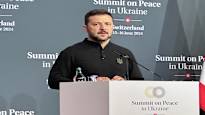Ukraine achieved its most important goal at the meeting: it reminded the whole world of its own difficult situation, writes ‘s Kyiv reporter Maxim Fedorov.
Maxim FedorovUkrainian reporter
KIEV Before the conference held in Switzerland at the weekend, concern was expressed in Ukraine about what the anti of such a peace conference could be, where there is practically no talk of peace.
In order to include the maximum number of countries, the meeting was taken to Volodymyr Zelensky only three of the ten articles of the peace plan. Those that were expected to reach consensus among all participating countries: nuclear safety, food safety, and prisoner exchange.
The restoration of the 1991 borders or the withdrawal of Russian troops as a scenario for the end of the war was not on the agenda.
Outside of Ukraine another factor caused concern. Can peace in Ukraine be promoted if the aggressor party is not involved in the negotiations?
Russia was not invited to this conference, and Vladimir Putin the exit on Friday was like living proof why the invitation did not come.
Namely, Putin demanded the withdrawal of the Ukrainian armed forces from four Ukrainian territories, which are currently partially occupied by Russia. In addition, Ukraine must bury its plans to become a member of NATO.
It was more of an ultimatum than a peace plan, which is as far as possible from how the West sees the war ending. In these settings, it would have been wishful thinking to expect too much from the discussions at Bürgenstock.
Ukraine is to some extent myself guilty of the fact that there were a lot of expectations from the conference. It positioned the meeting as a certain turning point, even though there had been peace conferences before.
The most tangible result of the weekend is the final document, a joint declaration, signed by all the participants except a dozen countries.
However, Ukraine has achieved its most important goal at the conference: it reminded the world of its own situation at a time when Russia’s war of aggression no longer really seems to be of interest to anyone but Russia’s neighboring countries.
For many months, Ukraine remained in the headlines in connection with the word peace – not only because of the war. Just preparing for the conference forced many countries out of their neutrality bubble to think about their own position on the Russian attack.
Meeting in Switzerland is a kind of prelude to the next peace conference that Zelenskyi has talked about today.
According to the president of Ukraine, it will be organized “in months and not years” and possibly Russia will also be invited.
Minister of Foreign Affairs of Ukraine Dmytro Kuleba has repeated the same idea, which at the moment sounds revolutionary: “The moment will come when we have to talk with Russia. But we will not let Russia speak the language of ultimatums.”
So far, however, Russia does not know any other language.
